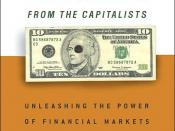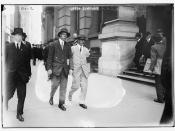Dreams are optimistic and desirable and can come in many forms, such as a vision, an inspiration, or even a promise from someone. Jurgis Rudkus envisioned a promise of prosperity guaranteed by the capitalist regime, but the prosperity visualized was only that of a mirage. Sinclair uses Jurgis' unfulfilled dreams to point out the evil deceptions and deceits practiced by capitalism.
The first run in that Jurgis has with the capitalists "wolves" starts with the purchase of a "new" home. The naïve Lithuanian family buys a home without knowing any of the details that come along with the purchase of a home. The real estate agent, personifying capitalism, cons the family into believing they can actually own the so-called new home. "In the first place as to the house they had bought, it was not new at all, as they had supposed; it was about fifteen years old, and there was nothing new upon it but the paint...The
house was one of a whole row that was built by a company which existed to make money by swindling poor people." (Sinclair, 81) This fateful event begins a dominoe effect of struggles, and the deterioration of Jurgis' dream.
Capitalism controlled every aspect of Jurgis' family and life. " The whole of society is in their grip, the whole labor of the world lies at their mercy-and like fierce wolves they rend and destroy, like ravening vultures they devour and tear" (Sinclair, 364). The packers made it impossible for even the children to go to school and be educated. The low wages obliged the children to work in order for survival. Sinclair illustrates how capitalism snares all of its laborers into its will and its ways, never for this laboring class to become prosperous or educated but only to remain a device...


